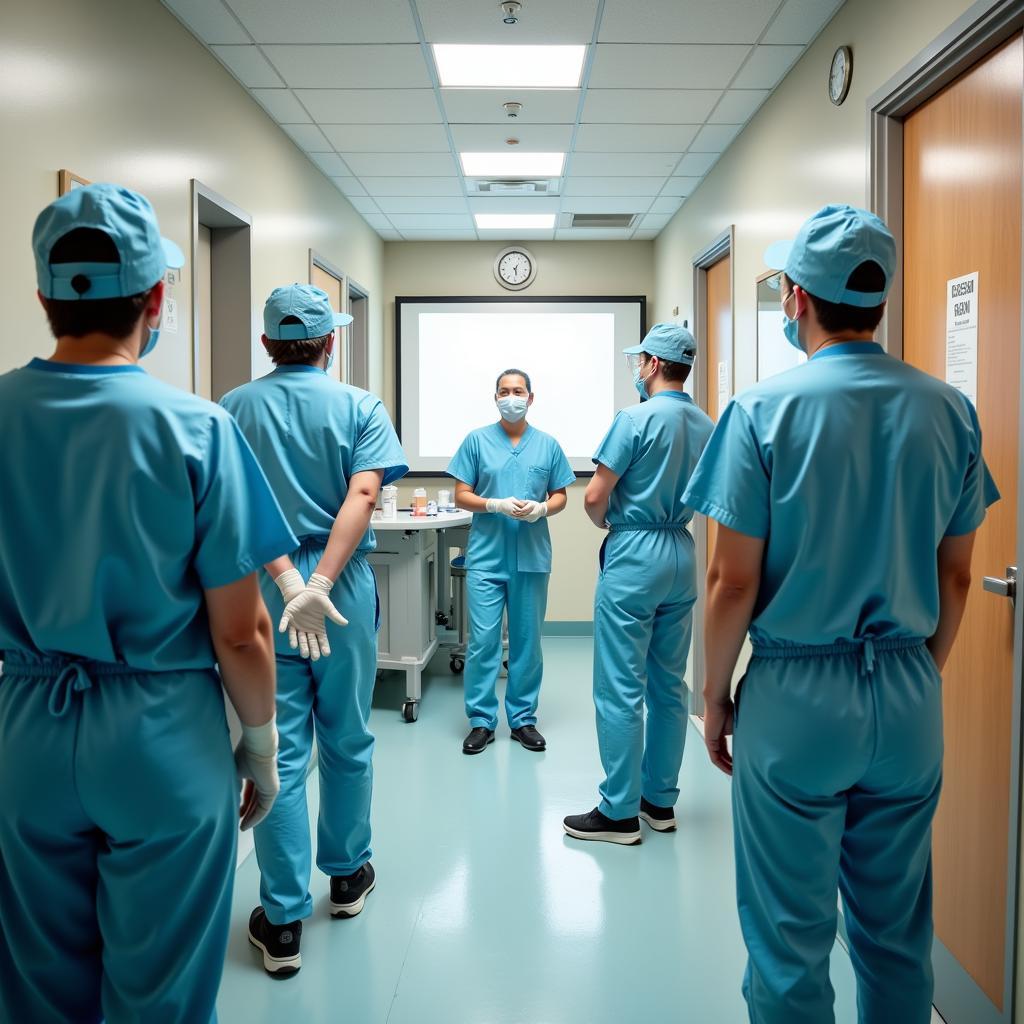Hospital Custodian Duties are essential for maintaining a clean, safe, and healthy environment for patients, staff, and visitors. While often overlooked, these professionals play a critical role in infection control, patient satisfaction, and the overall smooth operation of a healthcare facility.
More Than Just Cleaning: The Scope of Hospital Custodian Responsibilities
Hospital custodian duties extend far beyond basic cleaning tasks. They encompass a wide range of responsibilities, including:
- Infection Control: Custodians are on the front lines of preventing the spread of infections. They use specialized cleaning agents and techniques to disinfect patient rooms, operating rooms, and other critical areas, adhering to strict protocols to minimize the risk of healthcare-associated infections (HAIs).
- Waste Management: Proper handling and disposal of medical waste are crucial for maintaining a safe and hygienic environment. Custodians are responsible for collecting, segregating, and disposing of various types of waste, including hazardous materials, sharps, and regular trash, in accordance with safety regulations.
- Floor Care: Maintaining clean and polished floors goes beyond aesthetics; it directly impacts safety. Custodians operate specialized equipment to scrub, wax, and buff floors, ensuring they are slip-resistant and safe for patients and staff.
- Restroom Sanitation: Hospital restrooms require meticulous cleaning and disinfection. Custodians ensure restrooms are stocked with essential supplies, sanitized regularly, and free of unpleasant odors, contributing to a positive experience for patients and visitors.
- Patient Room Turnover: When a patient is discharged or transferred, custodians play a vital role in preparing the room for the next occupant. They thoroughly clean and disinfect all surfaces, change linens, and replenish supplies, ensuring a welcoming and hygienic space for incoming patients.
The Importance of Training and Expertise
 Hospital Custodian Training on Infection Control Procedures
Hospital Custodian Training on Infection Control Procedures
Effective execution of hospital custodian duties necessitates specialized training and knowledge. Custodians must be well-versed in:
- Infection Control Protocols: Understanding different types of pathogens, transmission routes, and appropriate disinfection methods is crucial for preventing the spread of infections.
- Chemical Handling: Custodians work with a variety of cleaning agents, some of which can be hazardous if not handled properly. Proper training on chemical safety, storage, and use is essential for their well-being and the safety of others.
- Equipment Operation: From floor scrubbers to specialized cleaning tools, custodians must be proficient in operating and maintaining various types of equipment. Training on equipment use ensures both efficiency and safety.
- Safety Procedures: Hospital environments present unique safety hazards, and custodians must be trained to identify and address potential risks. This includes understanding proper lifting techniques, using personal protective equipment (PPE) correctly, and following established safety protocols.
Beyond the Checklist: The Human Impact of Hospital Custodian Duties
While the technical aspects of hospital custodian duties are crucial, it’s equally important to recognize the human impact of their work.
- Patient Comfort and Well-being: A clean and well-maintained environment significantly contributes to patient comfort and recovery. Custodians play a direct role in creating a positive and healing atmosphere.
- Staff Morale and Productivity: A clean and organized workplace positively impacts staff morale and productivity. Custodians contribute to a more pleasant and efficient working environment for healthcare professionals.
- Public Perception and Trust: A clean and well-kept hospital reflects positively on the facility’s commitment to hygiene and patient care, instilling trust and confidence in those who enter its doors.
“A hospital’s cleanliness is a silent but powerful indicator of its overall quality of care,” says Dr. Jane Miller, an infectious disease specialist. “Custodians are the unsung heroes who work tirelessly behind the scenes to ensure a safe and healing environment for all.”
 Hospital Custodian Interacting with a Patient
Hospital Custodian Interacting with a Patient
FAQs: Common Questions About Hospital Custodian Duties
1. What are the typical work hours for a hospital custodian?
Hospital custodian positions often involve shift work, including evenings, nights, and weekends, to ensure continuous cleaning and maintenance of the facility.
2. What are the physical demands of the job?
The role can be physically demanding, requiring standing, walking, lifting, and bending for extended periods.
3. What are the career advancement opportunities for hospital custodians?
With experience and additional training, custodians can advance to supervisory roles or specialize in areas like floor care or infection control.
4. What qualities are important for success in this role?
Attention to detail, a strong work ethic, reliability, and a commitment to cleanliness and hygiene are essential qualities for hospital custodians.
5. How can I learn more about hospital custodian job openings?
You can find hospital custodian job postings on online job boards, through healthcare staffing agencies, or by contacting the human resources department of hospitals directly.
The Essential Role of Hospital Custodians
Hospital custodian duties are integral to the efficient and safe operation of any healthcare facility. Their meticulous work ensures a hygienic environment, prevents the spread of infections, and contributes significantly to patient comfort and well-being. Recognizing and valuing the contributions of these dedicated professionals is essential for maintaining a high standard of healthcare.
For inquiries about career opportunities or our services, please contact us at Phone Number: 02437655121, Email: [email protected] or visit us at: Số 298 Đ. Cầu Diễn, Minh Khai, Bắc Từ Liêm, Hà Nội, Việt Nam. Our dedicated customer support team is available 24/7 to assist you.